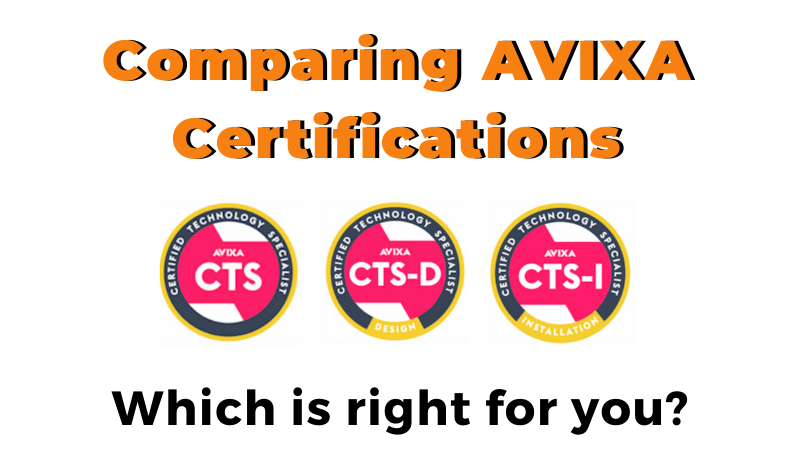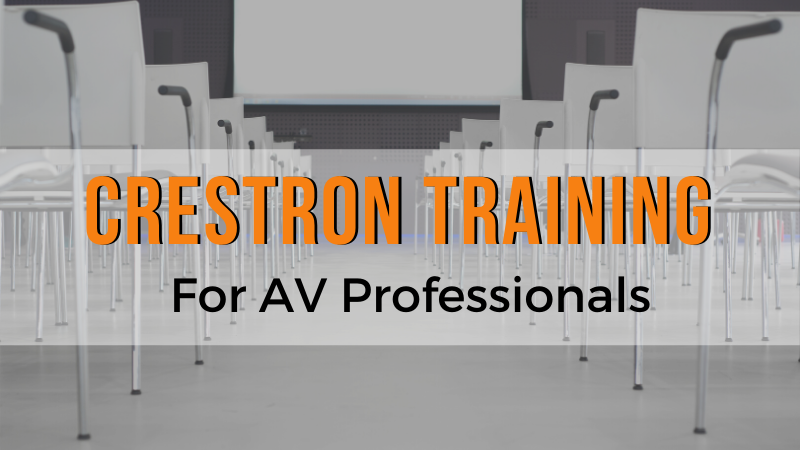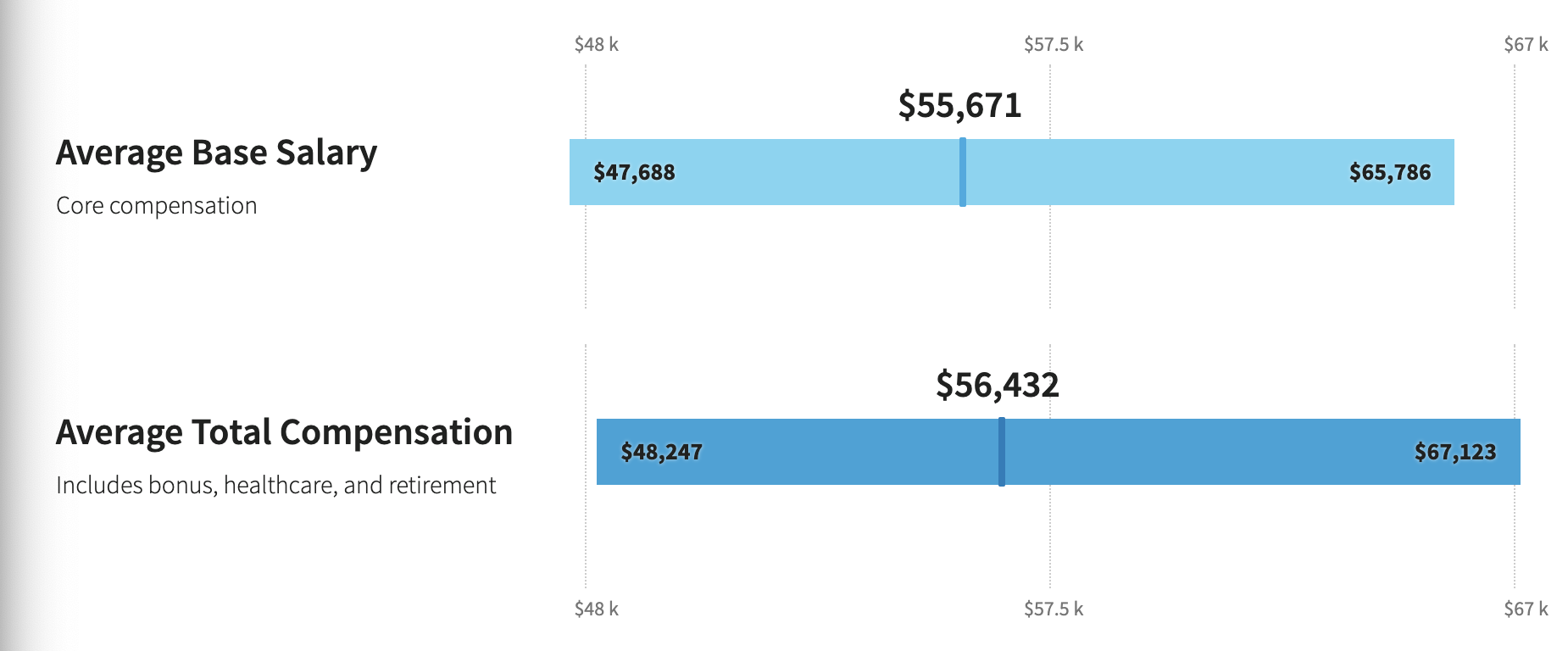Avixa CTS or Crestron: Weighing the Importance of AV Certifications
Looking to further your career in the audio visual industry?
There are many different types of AV training to keep in mind...
The tsunami wave of new AV technology and the many segments of the AV industry may leave candidates feeling dizzy. Live events, which account for a considerable chunk of AV, may sing to your inner audiophile. On the other hand, tech-savvy av professionals have made their entire careers servicing videoconferencing technologies (Cisco Webex, Zoom).
Then there is AV Integration, which is more like the construction business. AV integration requires designing and installing, troubleshooting, and maintaining AV systems. The demand for qualified technicians in this field is especially high.
Every business is seeing the value in a new conference room; Complete with videoconferencing, sound and lighting, and large format displays. Software video conferencing companies like Webex has also upped the ante on smart rooms. Systems can now be remotely integrated, controlled and supported through network integration.
AV Professional Looking for a Job? - Click Here to Connect with a Recruiter
Projections for the AV Industry
As our world becomes smaller the goal of staying connected remains a global imperative. AV integration has experienced the most dynamic growth.
AVIXA, the board which handles licensure for the Audiovisual Industry, has marked this trend. AVIXA Board of Director Jeff Day, cited that by 2023 AV Integration (ProAV) will be a “230 Billion Dollar Market”. This outpaces our country’s projected GDP rate considerably.
So it stands to reason that getting a job in the AV Integration space should be relatively easy... right?
Here’s the kicker…
There seems to be some confusion as to what technical experience hiring managers are looking for in AV candidates. AVIXA’s Sean Wargo, Director of Market Intelligence, elaborates:
“The market for AV solutions is consistently strong; the industry must continually grow to meet the demand...the challenge is often finding the qualified labor to staff the influx of AV design and integration projects.”
Sean Wargo, AVIXA
Simply put, there are not enough qualified technicians and designers to step into these roles opening up at the AV Integrators. Many hiring managers elect to pass on candidates coming from other roles in the AV field.
Which qualifications are in demand for hiring managers?
An AV technician needs to know the ins and outs of basic installation. This includes pulling and terminating cat5 and cat6 cable, soldering, installing LEDs, projectors, and microphones.

But is it enough to advance past an entry-level technician job?
Margins are shrinking when it comes to building and selling hardware systems, and trending more towards software-based solutions. Now more than ever, it is in the best interest of savvy AV technicians to invest in the right vendor certifications. The issue is, there are almost as many industry certifications as there are racks of gear being pumped by these integrators.
You have the AVIXA CTS or CTS D or CTS I variants. There is the slew of Crestron certifications. Let’s not forget Extron, Biamp, Tesira, and still, the list goes on.
Not to mention industry certifications tend to be on the pricey side. For example, the CTS prep course (highly recommended) is around $1000. The CTS exam itself is $175. Getting all the AV certifications can be an expensive and time-consuming undertaking.
Which AV Training Courses are Most Important
There are no simple answers. This author’s job involves talking to experienced candidates and hiring managers in the audiovisual industry.
I started asking the question: in your experience, what is the best experience?
Over several conversations between candidates and managers alike certain patterns began to emerge.
One key takeaway is the AVIXA CTS certification has value and is globally recognized.
However, it’s value to hiring managers is that it covers broad industry knowledge. In this way, it is more of a ticket to play as opposed to any indication of specific knowledge or experience.
More credence might be given to the CTS -I (for AV Installation) and CTS-D (for Design). These tests are regarded as more difficult and deal with specific job functions in AV. Still, the CTS certifications serve the valuable purpose of helping you gain visibility amongst hiring managers and recruiters. In one manager’s words, a CTS is never required but shows the individual is “self-motivated and passionate about AV.”
Hiring Manager Looking for a Candidate? - Click Here to Connect with a Recruiter
Vendor-Specific Training
The general consensus seems to be that vendor-specific training is much more applicable in the field. While every integrator’s process is a little different, there is considerable overlap in the technology being utilized. Certain vendor certifications appear to be worth their weight in gold when it comes to getting recognized by hiring managers. As stated earlier, many of these certifications line up with the trend of AV moving from hardware to software business.
Crestron Certifications
Crestron, which is the Windows software used to program audiovisual components in smart rooms, is ubiquitous in commercial settings.
Installers that possess certifications from Crestron, such as the DCM-E-4k, consistently have an edge up in the marketplace.
Candidates applying for Field Engineer need to know how to use Crestron Toolbox, and should also know its basic functions.
Many techs hear the word “programming” and want to run for the hills. However, the training is not as scary as one might think. According to one candidate with 30 years in ProAV:“Crestron’s certification program is fabulously well run and gives plenty of time for test preparation.”
DSP Vendor Certifications
DSP vendor certs such as Biamp, Dante and Tesira also score high points on the application.
Again, integrators will vary in their choices, but Biamp’s offerings in particular thoroughly cover the “audio” in audiovisual. Acoustic Echo Cancellation (AEC) is one specific area that is covered, to achieve maximum speech quality in audio.
Many integrators will have at least one key contact on staff that is Biamp certified and also serves as a Biamp channel partner. So you can bet, Biamp certified engineers that can write DSPs are highly sought after by many AV integrators.
Are AV Certifications Worth It?
With all this said it may come as no surprise that to hiring managers, experience trumps most anything. If you’re not yet working on ideal AV projects, you should consider continued education in the form of AV certifications.
It is true that many firms will pay for training. But, what if you are not currently employed or climbing the ranks at an integrator?
If coming out of pocket is not an option, many vendors have free online training to get you started. Targeting AV integration projects that are using these technologies and seeking an entry-level spot is also a strategy worth considering.
Sound like you? J.Patrick & Associates has multiple AV Industry Jobs which we encourage you to check out!
Looking for a project engineering, audio engineering, project manager, sound engineer, design engineer, sound technician, or any technician position? Click Here to search all our jobs!
Related Blogs:
Do you have what it takes to be an AV Technician?
How to Become a Crestron Programmer in the AV Industry

















